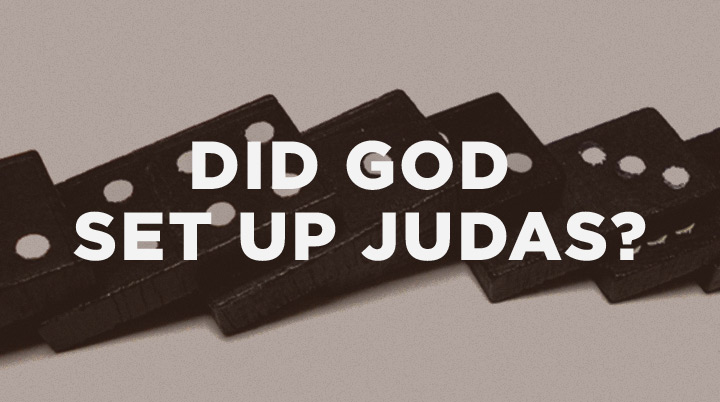Latest
-
Objections to the Christian Faith from the Unchurched and De-Churched
 Tue Dec 02, 2014
Tue Dec 02, 2014
by Resurgence -
Craig Groeschel: We Innovate for Jesus
 Tue Oct 14, 2014
Tue Oct 14, 2014
by Resurgence -
Mark Driscoll: Revelation
 Tue Oct 07, 2014
Tue Oct 07, 2014
by Resurgence -
RESURGENCE LEADERSHIP #034: JOHN PIPER, WHY I TRUST THE SCRIPTURES, PART 2
 Tue Sep 30, 2014
Tue Sep 30, 2014
by Resurgence -
Resurgence Leadership #033: John Piper, Why I Trust the Scriptures, Part 1
 Tue Sep 23, 2014
Tue Sep 23, 2014
by Resurgence

Archives
Did God set up Judas?

Judas was not an innocent bystander when Satan entered him.
Holy Week is the backdrop to the greatest betrayal in all of history. It was Thursday night and the disciples gathered in a second story room in a villa inside the city of Jerusalem.
The emotions in the room must have been running high. This would be the last supper Jesus would have with his brothers, friends, and disciples before his death. The conspiracy of betrayal was already in play as Jesus shared this meal with his disciples. Earlier he had washed their feet even the heel of the one poised to crush him.
The conspiracy was uncovered that night as Jesus announced, “Truly, I say to you, one of you will betray me” (Matt. 26:21–25). The culprit was revealed as he dipped his hand in the bowl with Jesus.
Did God set up Judas?
Salvation is a work of God
God orchestrated the betrayal and murder of Jesus (Acts 2:23; 4:27–28). This is a crucial point. If God did not orchestrate the death of Christ, then the death of Christ could not have saved us from our sins, and we would perish in hell forever. Jesus lived to die and to save his people from their sins (Matt. 1:21).
Jesus’ betrayal along with the rejections, beatings, and even his death itself were all acts of God foretold by the Scriptures (Psa. 41:9; Jer. 19:1–13; Zech. 11:12–13), and by Jesus himself.
God did not force Judas’ hand.
The heart of the gospel—God’s redemptive plan of salvation—is that God has done all of it by his hand according to his plan (Acts 4:27–28).
This is no mere human conspiracy; this was a sovereign work of God. He orchestrated every moment of Holy Week to remind us that salvation is a work of God alone (Jon. 2:9).
With this said, it naturally brings up the question, “Did he set up Judas to fall?”
Was Judas a mindless zombie?
Jesus chose Judas to be a part of the twelve, but yet knew he would betray him (Mark 14:18, 21; John 6:70). Luke tells us in Luke 22:3 that, “Satan entered into Judas called Iscariot.”
So, was Judas a mindless zombie, set on an uncontrollable mission by the hand of God to betray Jesus?
No.
God did not force Judas’ hand. Judas made conscious choices every step of the way and eventually he chose to betray Jesus.
There are no innocent bystanders. We are all sinners.
Even after Judas betrayed Jesus, he changed his mind and said, “I have sinned by betraying innocent blood” (Matt. 27:3–5). He was remorseful, but not repentant, of his actions. Big difference.
Yet all along Judas had been betraying Jesus. He was a thief (John 12:4–6). He loved money and power more than he loved Jesus. Yet Jesus loved him, and even when Judas betrayed him with a kiss, Jesus still called him “friend” (Matt. 26:50).
Judas was not an innocent bystander when Satan entered him.
Why did God save me?
The truth is, there are no innocent bystanders. We are all sinners.
As we look at Judas, we should be humbled and ask what lesser things have stolen away our hearts? Money? Power? Possessions? We must repent and remember that our sinful desires are deceptive and will ultimately betray us, and our sins are far more grievous to the one who gave his life for us.
Judas’ betrayal of Jesus should humble us.
The greater question from all of this is, “Why did God save me?” The short answer: for his glory and by his grace.
As we go through this Holy Week and contemplate the events that unfolded that week, Judas’ betrayal of Jesus should humble us. Christ’s perfect life, obedient death on the cross and Easter morning resurrection should astound and amaze us.
Jesus lived and died for us to reconcile us to God, even while we were God’s enemies (Rom. 5:10).